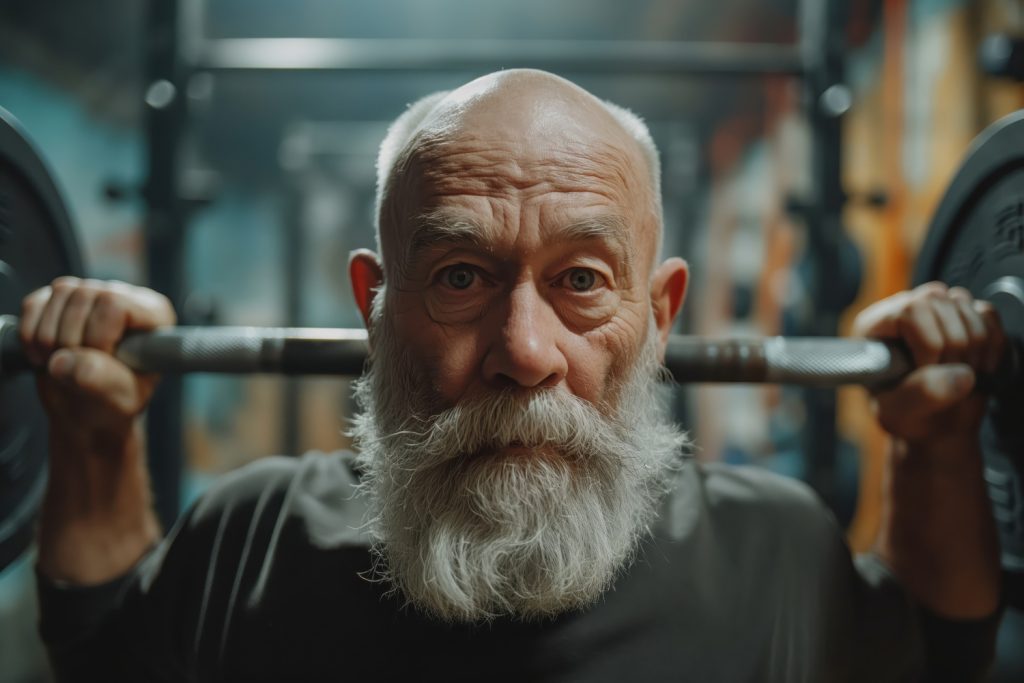Let’s talk about something that affects pretty much every guy but rarely gets discussed at the dinner table: how our bodies change as we age, particularly when it comes to testosterone levels. This isn’t about chasing some fountain of youth or miracle fixes – it’s about understanding what’s happening under the hood so you can make informed decisions about your lifestyle.
The Testosterone Timeline: What’s Really Happening
Here’s the thing that caught me off guard when I first learned about it: testosterone levels don’t just suddenly drop off a cliff when you hit 40. It’s more like a slow leak in a tire – gradual, steady, and easy to miss until you really notice the difference.
Most guys reach their testosterone peak somewhere in their late teens to early twenties. From there, levels typically decline by about 1-2% per year after age 30. Doesn’t sound like much, right? But compound that over a decade or two, and you’re looking at a pretty significant shift.
What makes this whole situation more complex is that every guy’s baseline is different. Some men naturally have higher levels to begin with, while others start lower. This means that “normal” ranges can vary quite a bit from person to person – what feels energetic and strong for one guy might feel sluggish for another.
Beyond the Numbers: What This Actually Feels Like
The research shows us the statistics, but let’s talk about what this actually means in real life. Many men in their 40s and 50s report subtle changes that they initially chalk up to just being “older” or “busier.”
You might notice that building muscle takes more effort than it used to. Recovery from workouts stretches longer. That afternoon energy crash becomes more pronounced. Sleep quality might shift – you fall asleep fine but wake up feeling less refreshed. Some guys notice changes in mood stability or find themselves feeling less motivated about things they used to enjoy.
The tricky part is that these changes happen gradually. It’s not like flipping a switch – it’s more like the slow adjustment of dimmer lights. Your body adapts, and you adapt, often without realizing how much has shifted over time.
The Lifestyle Connection: More Than Just Biology
Here’s where things get interesting, and frankly, more hopeful. While aging is inevitable, research suggests that lifestyle factors play a huge role in how our bodies age – including hormone production.
Sleep: The Foundation Nobody Talks About Enough
This one’s a game-changer that doesn’t get nearly enough attention. Quality sleep isn’t just about feeling rested – it’s when your body does most of its hormone production and repair work. Studies consistently show that men who get consistent, quality sleep maintain better hormone profiles as they age.
The sweet spot seems to be 7-9 hours of quality sleep, with particular emphasis on deep sleep stages. This isn’t just about time in bed – it’s about creating conditions for restorative sleep. Cool, dark rooms, consistent sleep schedules, and limiting screen time before bed all contribute to better sleep quality.
Movement and Strength: Use It or Lose It
Regular physical activity, particularly strength training, appears to have a significant impact on how men age. This isn’t about becoming a gym rat – it’s about maintaining muscle mass and bone density, which naturally decline with age.
What’s fascinating is that research shows both cardiovascular exercise and resistance training offer benefits, but they work differently. Cardio supports overall health and circulation, while strength training specifically helps maintain muscle mass and may support healthy hormone levels.
The key is consistency rather than intensity. A sustainable exercise routine that you can maintain for years is far more valuable than sporadic intense workouts that you burn out from.
Nutrition: Fuel for the Long Haul
Your nutritional needs shift as you age, and what worked in your twenties might not serve you as well in your forties and beyond. This isn’t about restrictive dieting – it’s about eating in a way that supports your body’s changing needs.
Protein becomes increasingly important for maintaining muscle mass. Healthy fats play a crucial role in hormone production. Micronutrients like vitamin D, zinc, and magnesium are often overlooked but can significantly impact how you feel and function.
Interestingly, maintaining a healthy weight becomes more important as you age, not just for appearance but for overall hormone balance and health. Excess body fat, particularly around the midsection, can impact hormone production and metabolism.
Stress: The Silent Saboteur
This might be the most overlooked factor in how men age. Chronic stress doesn’t just make you feel lousy – it can actually accelerate many aspects of aging, including changes in hormone levels.
The modern lifestyle tends to keep stress levels elevated through work pressures, financial concerns, family responsibilities, and constant digital connectivity. Your body doesn’t distinguish between running from a predator and dealing with a difficult boss – stress is stress from a biological perspective.
Finding sustainable ways to manage stress isn’t just about feeling better day-to-day – it’s an investment in how you’ll age. This might be regular exercise, meditation, hobbies you enjoy, time in nature, or social connections. The specific approach matters less than finding something that works for you and sticking with it.
Environmental Factors: The Stuff Nobody Warned Us About
Here’s something that’s become increasingly apparent over the past few decades: our environment impacts our biology more than previous generations realized. We’re exposed to chemicals, plastics, and compounds that didn’t exist when our grandfathers were our age.
Some research suggests that certain environmental factors – things like BPA in plastics, certain pesticides, and other industrial chemicals – might impact hormone levels. While we can’t control everything in our environment, we can make conscious choices about things like the products we use, the food we eat, and how we store and prepare meals.
This isn’t about becoming paranoid or overhauling your entire life overnight. It’s about being aware and making gradual, sustainable changes where it makes sense.
The Social and Mental Side of Aging
Let’s be honest – how we feel about aging affects how we experience it. Men who maintain strong social connections, continue learning new things, and stay engaged with life tend to age differently than those who become isolated or mentally stagnant.
This isn’t just feel-good advice – research consistently shows that mental and social health impact physical health as we age. Having a sense of purpose, maintaining friendships, staying curious about the world, and continuing to challenge yourself mentally all contribute to healthier aging.
What You Can Actually Control
The frustrating thing about aging is how much feels out of your control. You can’t stop time, you can’t change your genetics, and you can’t undo decades of past choices. But there’s actually quite a bit within your influence.
Start Where You Are
The best time to start taking care of yourself was 20 years ago. The second-best time is right now. Whether you’re 35 or 55, the choices you make today impact how you’ll feel next year and next decade.
Focus on Consistency Over Perfection
Small, sustainable changes compound over time. Getting 30 minutes of movement most days is better than sporadic intense workouts. Improving your sleep by 30 minutes per night is better than perfect sleep hygiene that you can’t maintain. Eating one more serving of vegetables daily is better than a complete diet overhaul that lasts two weeks.
Listen to Your Body
Pay attention to how different lifestyle choices make you feel. Your body provides feedback – energy levels, sleep quality, mood, recovery from exercise, general sense of well-being. This feedback is valuable information about what works for your specific situation.
Aging Well vs. Fighting Age
There’s a difference between aging well and fighting age. Fighting age often involves chasing quick fixes, miracle solutions, or trying to turn back the clock. Aging well is about adapting to your body’s changing needs while maintaining vitality and quality of life.
The men who seem to age best aren’t necessarily those who look youngest or have the highest hormone levels. They’re the ones who remain active, engaged, curious, and connected. They adapt their approach to fitness, nutrition, and lifestyle as their needs change rather than rigidly sticking to what worked when they were younger. This perspective shift can be liberating. Instead of trying to maintain your 25-year-old body, you can focus on being the healthiest, most vital version of your current age.
Testosterone levels naturally decline with age – that’s biology. But how this impacts your daily life depends largely on factors within your control: sleep, exercise, nutrition, stress management, and social connections. The goal isn’t to stop aging or chase specific numbers on lab tests. It’s to age in a way that allows you to maintain energy, strength, mental clarity, and enjoyment of life for as long as possible.
Understanding what’s happening in your body as you age empowers you to make informed decisions about your lifestyle. It’s not about finding a magic bullet – it’s about making sustainable choices that support your long-term health and vitality. Remember, this is a marathon, not a sprint. The choices you make consistently over months and years matter far more than any single decision or quick fix. Your future self will thank you for the investments you make in your health today.

Important Disclaimer: Thanks for reading — from all of us at First News US. This article is for informational and educational purposes only and is not intended as medical advice. The information provided should not be used for diagnosing or treating any health condition. Individual responses to aging and lifestyle factors vary significantly. Always consult with qualified healthcare professionals before making significant changes to your diet, exercise routine, or lifestyle, especially if you have existing health conditions or concerns. The author and publisher are not responsible for any adverse effects or consequences resulting from the use of any information, suggestions, or procedures described in this article.
Sources and Further Reading:
- American Journal of Men’s Health – various studies on aging and hormone levels
- Mayo Clinic Health Information – aging and men’s health
- Harvard Health Publishing – lifestyle factors and healthy aging
- National Institute on Aging – research on aging processes
- Sleep Foundation – sleep and hormone production research



